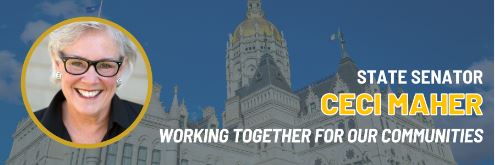Sen. Slap Leads Passage of Two Bills to Improve Access to Higher Education
Today, State Senator Derek Slap, Senate Chair of the Higher Education and Employment Advancement Committee led passage of two pieces of legislation to improve access to higher education. The legislation passed today changes the eligibility standards for the Connecticut Automatic Admission Program (CAAP) to increase equity and eligibility, and expands access to low-interest loans through the Connecticut Higher Education Supplemental Loan Authority (CHESLA).
“We know that removing barriers to access to higher education is one of the most effective steps toward educational equity,” said Sen. Slap. “Both of these programs – the loan authority and CAAP have been integral in helping students access opportunity and these changes will expand their reach. CAAP will continue to encourage more folks to matriculate, while now offering a level of transparency and increased fairness in their eligibility standards by considering unweighted GPAs instead of class rank. Expanding eligibility for CHESLA loans allows 17 year old high school seniors access to the same low interest student loans their 18 year old classmates have access to.”
Senate Bill 109 changes the eligibility requirements of the Connecticut Automatic Admission Program (CAAP) to increase equity and access for students. CAAP requires graduating Connecticut high school seniors who meet identified thresholds to be notified of their eligibility for automatic admission to participating colleges and universities. SB 109, passed today, changes the requirement for admission from a minimum class rank percentile to a minimum, unweighted grade point average (GPA).
This legislation seeks to make the pre-qualification threshold more transparent for students by relying on a GPA as opposed to class rank, which is not readily available to students. By using an unweighted GPA, the legislation seeks to make the program more equitable by reducing the importance of heavily weighted Advanced Placement (AP) courses. This is important because lower resourced school districts often have less AP courses available.
A student who qualifies is required to complete a simplified, free application for the participating colleges and universities that they wish to attend. The student will automatically receive a letter of acceptance and details about financial aid awarded.
According to Connecticut State Colleges & University (CSCU), this year, the total number of CAAP applicants has increased by 70%, and the total number of applicants to the CSCU schools has increased by 400%, or 3,259 students.
Senate Bill 304 allows students under 18 to apply for low-interest loans through the Connecticut Higher Education Supplemental Loan Authority (CHESLA) with a cosigner. Under current law, high school graduates under the age of 18 are unable to apply for loans through the quasi-public CHESLA. However, they are able to apply for private loans, often with much higher interest rates.
Both bills will now head to the House. |










